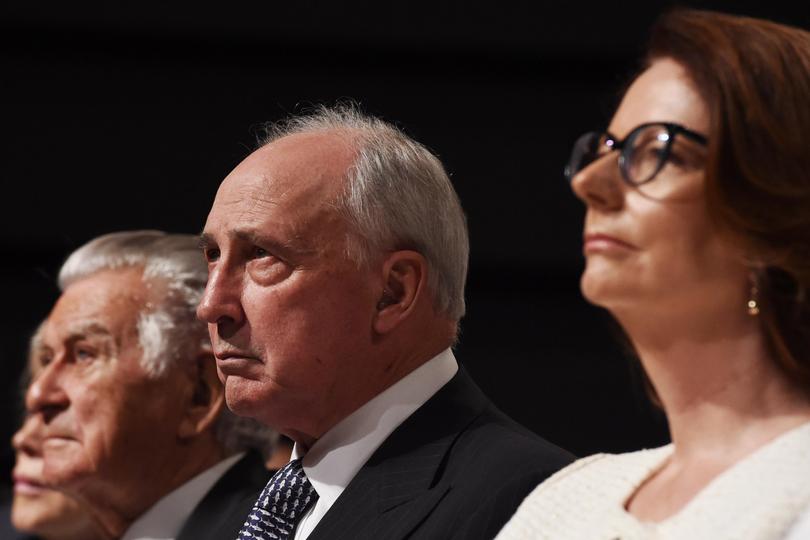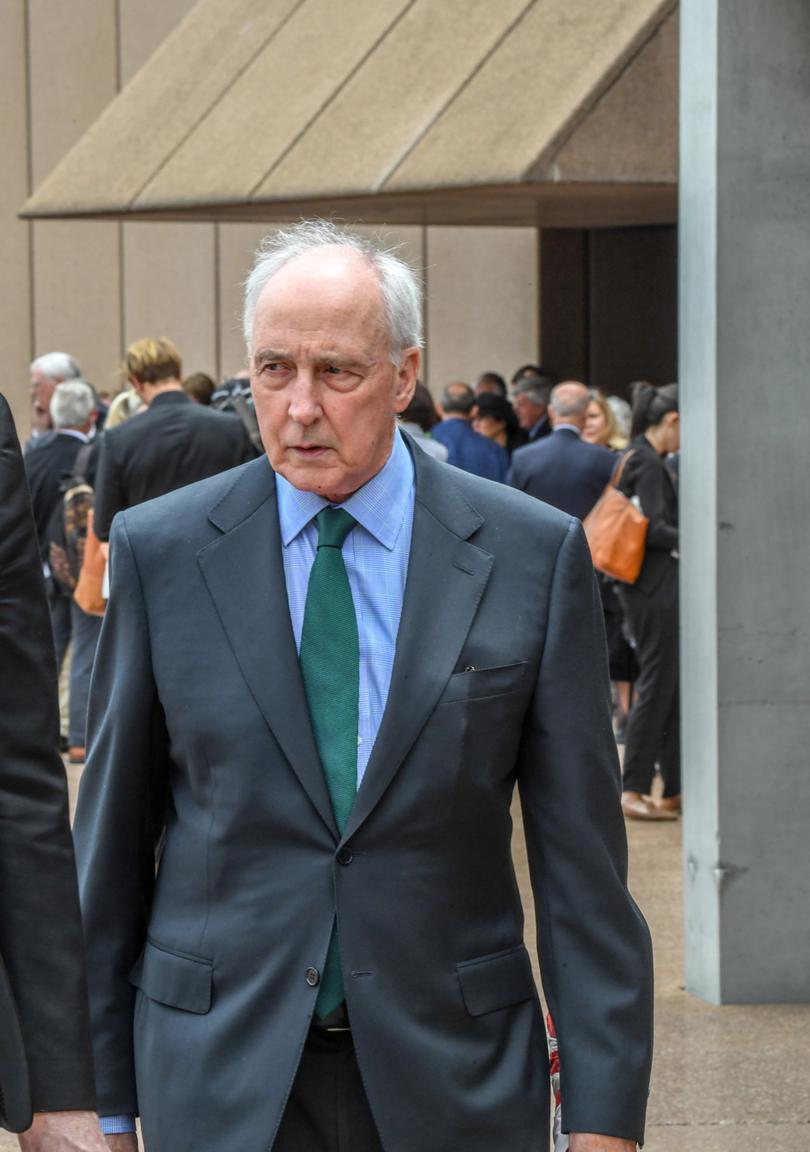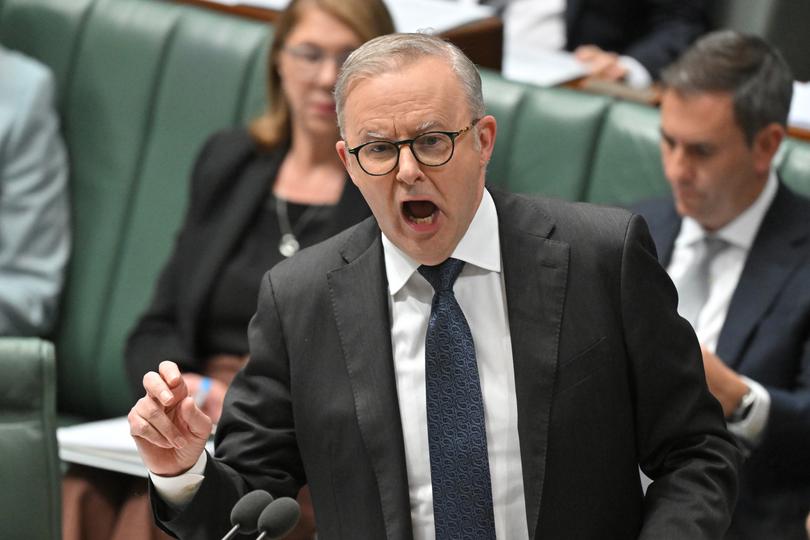PAUL MURRAY: Paul Keating sullies reputation with dangerous China ramblings and Labor is giving him free rein
PAUL MURRAY: It’s hard not to feel sad witnessing Paul Keating trash his reputation as a revered politician, allowing his dotage to erode some considerable achievements in office.

It’s hard not to feel sad witnessing Paul Keating trash his reputation as a revered politician, allowing his dotage to erode some considerable achievements in office.
His octogenarian ramblings don’t have Joe Biden’s excuse of someone trying to hang on to power too long. That was stripped from Keating many years ago.
His confused recent comments about Taiwan seem an attempt to roll back time to a point where he had something to offer the national debate.
Sign up to The Nightly's newsletters.
Get the first look at the digital newspaper, curated daily stories and breaking headlines delivered to your inbox.
By continuing you agree to our Terms and Privacy Policy.Unfortunately, he now just appears dangerously eccentric.
What Keating provided when he was striding the political stage was an authentic Australian view of the world. That made him worth listening to.
It was often pretty offensive to many people. But he was seeking to carve out an identity within Asia for a nation having trouble cutting its umbilical cord to Great Britain.
Keating was a brilliant treasurer because, gratingly for him, his prime minister — the far better politician of the two — allowed him to be.
Later, as prime minister himself, Keating was a disappointment. And that continues.

It was a West Australian, the national secretary of the Labor Party and later MP for Brand, Gary Gray, who labelled Keating in his final days in The Lodge as Captain Wacky.
Former Australian Journalist of the Year Pamela Williams described the decline in her 1997 book, The Victory, about Keating’s election loss the year before.
Some of the descriptions of Gray turning up to The Lodge mid-morning just weeks out from the election to find Keating still in his dressing gown and pyjamas listening to his political opponents on John Laws’ radio program are priceless.
“In earlier days, Gray had been more tolerant of Keating’s eccentricities,” Williams wrote.
“But in the lead-up to the election, the Prime Minister’s unpredictability and transient enthusiasms had exhausted all patience among senior campaign managers.
“They had secretly nicknamed him Captain Wacky. The name stuck as much for Keating’s oddball behaviour as for his inability to stick to the campaign message.
“He was easily distracted and clearly unable to resist any temptation to sling mud at the Opposition.”
These days, Keating saves most of his mud-slinging for his own side of politics.
And he’s got a lot crazier in recent times, even though many of his ardent adherents in the Left media don’t recognise the demise, yearning for glimpses of his celebrated and flamboyant repartee, which these days manifests as abuse.
But he gets regular gigs with the ABC and Nine Media as if he’s still got something cogent to say. One of those love-ins has turned septic, as Latika Bourke pointed out in The Nightly this week.
“Nancy Pelosi has said what Prime Minister Anthony Albanese and his increasingly feckless Cabinet won’t,” Bourke wrote.

Fresh from having extinguished Biden’s extended presidential ambitions, former speaker Pelosi ridiculed Keating’s August 8 Taiwan outburst on ABC’s 7.30 when she was asked about it on the same program this week.
The most erroneous and dangerous part of Keating’s 7.30 performance was when he referred to Taiwan as “Chinese real estate”.
That came in response to this question from host Sarah Ferguson: “Since the publication of the Defence Strategic Review, and it’s been clear the rapid and undeniable escalation of the Chinese military, why shouldn’t Australia embrace an alliance that counterbalances that power?”
“That power has no strategic designs on Australia,” Keating baldly stated. “What this is all about is the Chinese laying claim to Taiwan.
“And the Americans are going to say, ‘No, no, we’re going to keep these Taiwanese people protected’, even though they’re sitting on Chinese real estate.”
“What about Taiwanese real estate and the wishes of the Taiwanese people?” Ferguson asked.
“The Chinese real estate is part of China,” Keating asserted, essentially denying Taiwan’s right to exist independently, despite copious ethnic and historical evidence.
“Let me make the analogy: it would be like the Chinese saying to us, ‘We think Tasmania has been forgotten and poorly treated for many years and we want to keep the sea route down the east coast of Australia through Bass Strait and across to Perth and the Indian Ocean open so we are going to put some frigates there and we will economically support the Tasmanian people should they wish to secede from Australia.’ We would say that is shocking.”
What’s shocking is that analogy. Wacky. In fact, almost certifiable.
It was pulled apart on The Diplomat website by Melbourne-based foreign affairs analyst Grant Wyeth, who described the “Chinese real estate” line as historical nonsense.
“Taiwan has never been part of the People’s Republic of China (PRC) — a state created in 1949.
“Sovereignty is about what you can and cannot control, not what any state wishes it could control. Sovereignty should also derive from the consent of the people.
“The Taiwanese have consistently made it clear they have no desire to become part of the PRC, something Keating deems irrelevant to his hierarchy of Asia.
“Keating made the absurd analogy that seeking to deter PRC aggression against Taiwan was the equivalent of Beijing assisting Tasmania to secede from Australia.
“There is, of course, a more accurate analogy in the case of North Korea and South Korea — with a line of control being drawn at the conclusion of a civil war, and two new societies developing in distinct ways (or not developing in North Korea’s case). In the history of humanity, this is quite common.
“It is unlikely that Keating would claim that South Korea is sitting on ‘North Korean real estate,’ solely because Pyongyang believes this to be so.
“So why are the Chinese Communist Party’s feelings and the welfare of the Taiwanese deemed different to him?”
These are the sort of informed questions that Keating is rarely forced to face when invited onto friendly media platforms to spread his peculiar ideas.
The problem is that — though Pelosi hilariously didn’t know who he was — international audiences might regard his tenure as prime minister for four years as still relevant.
“If you were prime minister and you had the responsibility to defend Australia, wouldn’t you seek to counter an unprecedented military expansion the size of which we haven’t seen since the Second World War by the most powerful possible adversary?” Ferguson asked.
Keating is using his status as a former national leader deliberately to undermine AUKUS
“Australia is capable of defending itself,” Keating said, wiping aside mountains of defence reviews that say the opposite.
“What is a threat? That is an invasion. An invasion comes as an armada.
“With satellites today you would see the armada form. You would see it leave its harbour. You would see it for 10 to 15 days coming to Australia and you would sink every one of them on the way.
“You don’t need the United States to defend Australia.”
Apart from the “armada” argument being a straw man of Keating’s own demented confection, it is ridiculous to suggest that Australia alone has such military capacity.
How would we “sink them”? This is the bloke who once said the $368 billion AUKUS submarines would be “like throwing a handful of toothpicks at a mountain”.
Keating’s thinking is so outdated as to be dangerous. Any arrival of the invading Chinese by boat in Australia would come well after any “war” was lost by us.
Such a “war” would more likely be fought economically, by maritime blockades and in cyberspace.

And its origins are underway.
Keating is prepared to blithely disregard China’s ongoing threats to our military on the high seas and in the skies well away from its borders. These are not the actions of a friend.
Mute on its notorious list of 14 grievances against us, published in 2021.
He ignores the ruthless and massive economic punishment our rural producers were forced to endure because we apparently hurt its feelings over the origins of the catastrophic international pandemic emanating from China.
And he is silent about the many proven examples of China’s open interference in our democracy and its constant cyber-attacks on our institutions.
None of this is acceptable from a former Australian prime minister. He’s become an apologist.
Our current weak Prime Minister and his even weaker Deputy and Defence Minister seek to jokingly cover the embarrassment of a Labor statesman sprouting dangerous misinformation as merely an exercise of his free speech.
But Keating is using his status as a former national leader deliberately to undermine AUKUS, which is our most significant post-war security pact in a time of increasing global tensions.
Labor is quick to call out as “disinformation” the arguments of its political opponents.
It’s time Albanese stopped being what Keating once described as “a shiver looking for a spine to run up” and repudiated the Labor icon, without caveats, so Australians understand clearly what is at stake.
